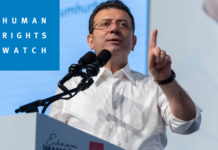Human rights groups in Turkey have called for the immediate release of Fatma Tokmak, a seriously ill inmate at Istanbul’s Bakırköy Women’s Prison, accusing the authorities of endangering her life by denying adequate medical care and ignoring court rulings, the Bianet news website reported.
At a press conference held Tuesday by four legal and human rights organizations, comprising the Human Rights Association (İHD), the Lawyers for Freedom Association (ÖHD), the Contemporary Lawyers Association (ÇHD) and the Society and Law Research Foundation (TOHAV), advocates warned that Tokmak, who suffers from advanced cardiac disease, asthma and hypertension, is at risk of dying behind bars unless action is taken immediately.
“Her condition is worsening. She cannot climb stairs, she struggles to get to medical appointments and she is in no condition to remain incarcerated,” her lawyer, Jiyan Kaya, who visited Tokmak in prison last week, said. Kaya added that Tokmak has not been given a surgery date despite critical heart complications diagnosed during her fifth angiography.
İHD representative Meral Nergis Şahin read a joint statement from the participating organizations, saying Tokmak’s illness is documented in medical reports, yet all applications for sentence deferral have been rejected. “The Council of Forensic Medicine [ATK] continues to deny her release despite clear, life-threatening conditions,” Şahin said.
The ATK frequently comes under criticism over its questionable reports that find ailing inmates fit to remain in prison. Rights advocates slam the agency over its lack of independence from political influence and its role in compounding the persecution of political prisoners.
Tokmak, a Kurdish woman who does not speak Turkish, was detained on December 9, 1996, along with her husband, over alleged links to the outlawed Kurdistan Workers’ Party (PKK), which is designated as a terrorist organization by Turkey and its Western allies.
She was held for 11 days in police custody at Istanbul’s counterterrorism department, together with her 2-year-old son Azat, where both were reportedly subjected to severe torture.
According to human rights reports, officers used electric shocks and put out cigarettes on Azat’s body in front of his mother to coerce confessions from her. Tokmak was stripped naked and forced to lie on the floor with her son, then hung by her arms and sexually abused. Officers allegedly threatened to rape her with a truncheon and once removed her son from the cell, saying she would never see him again.
No officers have ever been prosecuted, and legal avenues to bring the perpetrators to justice have been exhausted, rights groups say.
On September 17, 1997, Tokmak appeared before the State Security Court in İstanbul and was remanded to Gebze Prison. She was not provided with a Kurdish interpreter during the proceedings and was made to sign statements written in Turkish, a language she could not understand.
Tokmak’s trial lasted around nine years. She was briefly released on December 7 2005 for medical reasons but imprisoned again on March 3, 2006, after a high criminal court convicted her. Her sentence was upheld by the Supreme Court of Appeals in 2010.
Despite a European Court of Human Rights (ECtHR) ruling in her favor in 2010, which found violations of her rights during her arrest and trial, Turkish courts have refused to reopen her case or consider parole.
Ümit Biçer, a board member of the Turkish Human Rights Foundation (TİHV), described the state’s refusal to release critically ill inmates as “institutionalized cruelty.” “We consider the systematic denial of healthcare in prisons as a form of torture,” Biçer said. He noted that the İHD has identified over 1,400 seriously ill inmates across Turkey.
Other groups echoed the call for urgent action. “This is not just about Fatma Tokmak; it’s about hundreds of ill prisoners whose treatment is delayed or denied,” Naim Eminoğlu of the ÇHD said. “If medical care is postponed, the consequences are often irreversible.”
The Turkish government has long faced criticism from European institutions for its handling of political prisoners and chronically ill inmates. While the ECtHR has ruled that such practices violate the European Convention on Human Rights, Turkey’s response has often been limited.
Advocates submitted another sentence deferral request on May 8, 2025, but as of this week, there has been no response from the Ministry of Justice. “We call on all institutions, particularly the Ministry of Justice, to uphold Fatma Tokmak’s right to life,” Şahin said.















